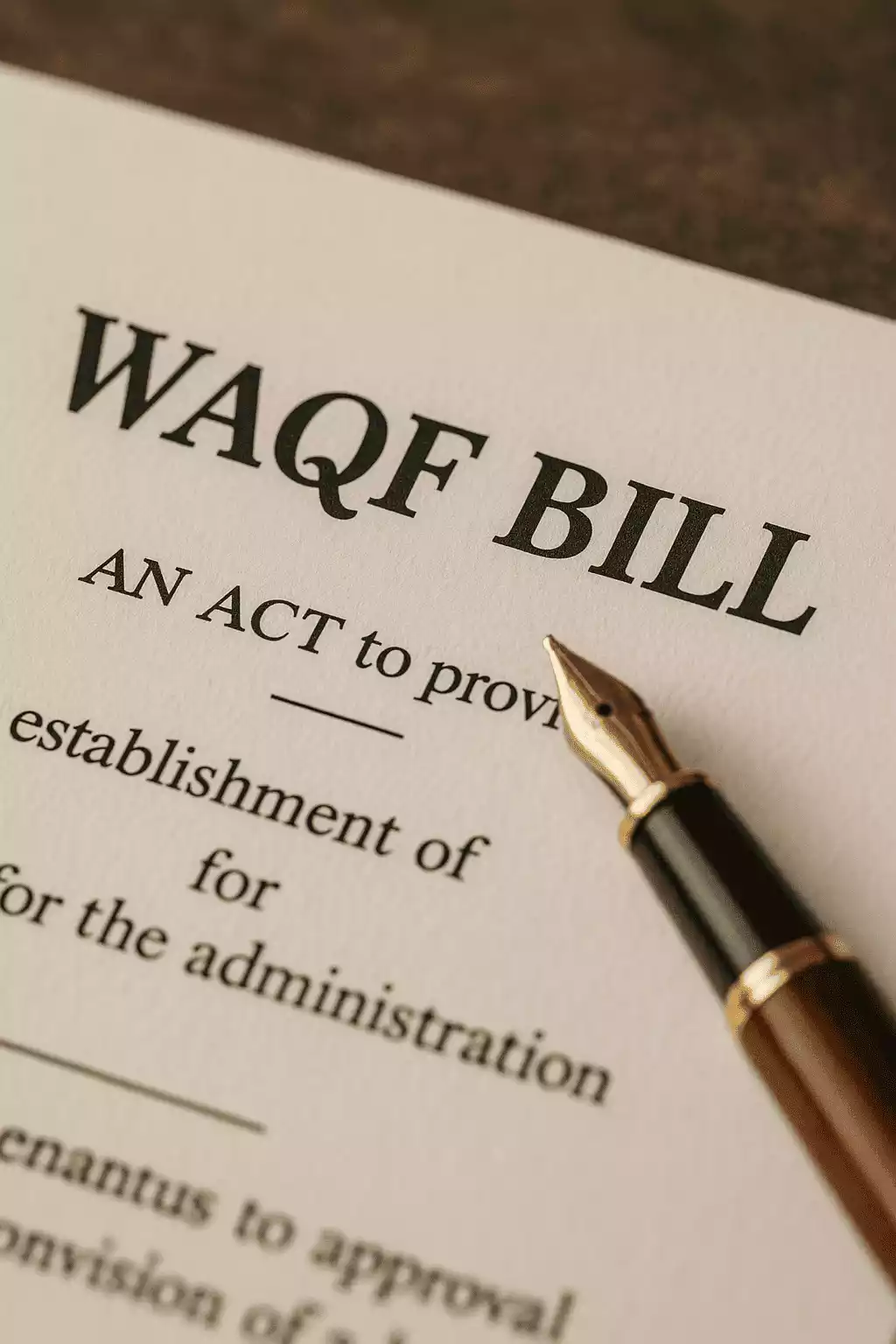Waqf Amendment Bill Approved by Rajya Sabha: What It Means for You

🌐 Introduction
Have you ever wondered what happens to properties donated for religious or charitable causes in India? Well, they often become part of something called Waqf. Recently, the Rajya Sabha approved a bill called the Waqf Amendment Bill, and it’s causing quite a stir! Whether you’re a legal geek, a curious citizen, or someone concerned about community welfare, this article is your easy-to-understand guide to what just changed—and why it matters.
🏛️ Background on Waqf Properties
What Are Waqf Properties?
Waqf properties are assets (like land, buildings, or even money) donated by individuals, typically Muslims, for religious or charitable purposes. Once declared as Waqf, the property is held in perpetuity and managed for the public good.
The Historical Role of Waqf in India
Waqf has existed in India for centuries. These properties have historically supported mosques, madrasas, orphanages, and even hospitals. However, the management of these assets hasn’t always been smooth sailing.
📜 The Original Waqf Act of 1995
The Waqf Act, 1995, was enacted to streamline and manage these properties better. It laid down:
- Formation of State Waqf Boards
- Mandatory registration of Waqf properties
- Process for dealing with illegal encroachments
But over time, this law became outdated and ineffective in dealing with new challenges.
⚠️ Need for Amendment
Why now? Let’s break it down.
Rising Concerns
- Encroachments on Waqf land skyrocketed
- Donors and communities complained about corruption
- Disputes dragged on for years
Public Grievances and State Conflicts
Many states reported difficulties in enforcing orders due to a lack of authority or coordination with central bodies. That’s when the idea of updating the law took shape.
🔧 Key Changes in the Waqf Amendment Bill
Here’s what the 2025 Amendment is trying to fix:
1. Simplified Property Registration
New digital systems will make it easier for State Waqf Boards to register and maintain records.
2. Time-Bound Decision Making
Tribunals must now resolve disputes within 12 months, cutting down years of waiting.
3. Protection Against Encroachment
The bill has made encroachment a more serious offense, with harsher penalties.
4. Transparency and Accountability
Boards must publish property lists online and provide public access to details.
⚖️ Dispute Resolution Mechanism
Special Tribunals
Dedicated Waqf tribunals will now hear cases and pass judgments faster than civil courts.
Quicker Redressal
The law mandates decisions to be time-bound, helping victims of illegal occupation or disputes.
🏢 Enhanced Role of State Waqf Boards
State Boards will now have:
- Direct control over decision-making
- Power to appoint local administrators
- Authority to audit and inspect properties
This makes governance tighter and reduces delays.
💥 Opposition and Controversies
Some political parties and minority groups raised eyebrows.
- Allegations of centralization of power
- Worries about property misuse
- Claims of insufficient consultation
These voices have triggered debates across social and religious circles.
🏛️ Government’s Justification
The Ministry of Minority Affairs argues:
- The amendments bring efficiency
- They aim to protect community assets
- It aligns with Digital India and transparency reforms
👥 How It Impacts Common People
Whether you’re donating property, running a mosque, or just a local citizen, this bill impacts you.
- Easier to check authenticity
- Faster conflict resolution
- Reduced corruption and unauthorized sales
🕌 Religious and Social Impact
The amendment ensures that properties stay true to their original purpose—helping religious and charitable institutions thrive, just as the donors intended.
📜 Legal Implications
With the formation of tribunals and stricter laws:
- Pending cases may be fast-tracked
- Courts now have clearer jurisdiction boundaries
- Encourages fair trials and uniform decisions
🔮 Future Outlook
Each state must now update its own implementation rules.
- Some may digitize faster than others
- Others may take time due to political friction
- Public and NGO watchdogs may emerge to monitor progress
📊 Table: Key Differences Between Historical and Contemporary Waqf Legislation
| Feature | Waqf Act 1995 | Waqf Amendment 2025 |
| Property Registration | Manual & delayed | Digital & time-bound |
| Dispute Resolution | Civil courts | Special tribunals |
| Encroachment Penalties | Light or delayed | Strict & enforceable |
| Public Access | Limited | Online databases |
| Accountability of Waqf Boards | Weak | Stronger checks and audits |
▶️ Relevant YouTube Video for More Info
Watch this simple explainer to understand the Waqf Amendment in under 5 minutes:
🧾 Conclusion
The Waqf Amendment Bill 2025 transcends mere legal terminology. It represents a vital advancement in safeguarding the integrity of religious and charitable assets. While it faces its fair share of debates, one thing is clear: this law has the potential to bring clarity, transparency, and efficiency to a system that has long been plagued by confusion and delay. The true impact of its implementation will only become clear with the passage of time, but it certainly represents a promising start.
❓FAQs
1. What is Waqf?
Waqf is a donation of property or funds for religious or charitable purposes, typically managed by a community board.
2. Who manages Waqf properties?
Waqf Boards at the state and central levels oversee the use, maintenance, and protection of these properties.
3. Why is the amendment controversial?
Some groups fear central overreach, lack of consultation, and misuse of property due to new powers granted to boards.
4. Does this affect religious rights?
The bill aims to protect rather than restrict religious rights by ensuring assets are used correctly.
5. Where can I find official info?
Visit the Ministry of Minority Affairs or your local State Waqf Board website for verified updates.



Latest version available at this page.
It’s amazing how quickly Uhmegle connects you with people from around the world. I’ve already made some great conversations here.
Clear, concise, and useful—that’s how I’d describe this article.
Rápido y sencillo en este sitio.
Random video chat can be tricky, but OmegleTV.tv never disappoints.
– it’s always active.
Thanks for sharing this. Vivuvi is one of the newest and most interesting platforms.
Great overview! For a reliable alternative, I’d recommend OmegleTV video chat, it’s fast and easy to use.
For those looking for an Omegle alternative, click here.
hgh only cycle
References:
hgh-x2 results (https://a-taxi.com.ua)
does hgh affect testosterone levels
References:
hgh legal kaufen – firsturl.de,
hgh hormon bodybuilding
References:
Hgh Injections Side Effects (Decoyrental.Com)
hgh morgens oder abends
References:
enouvelles.top
4 iu hgh per day results
References:
https://independent.academia.edu/
how much hgh should i take a day
References:
noticiasenvivo.top
Việc của bet thủ là chỉ cần đặt cược con số may mắn mà mình dự đoán sẽ trúng với số tiền cược hợp lý. Hệ thống tiến hành quay thưởng và cập nhật ngay sau đó, tỷ lệ thưởng 888SLOT có thể lên tới 1 ăn 99. TONY12-19
Your point of view caught my eye and was very interesting. Thanks. I have a question for you.